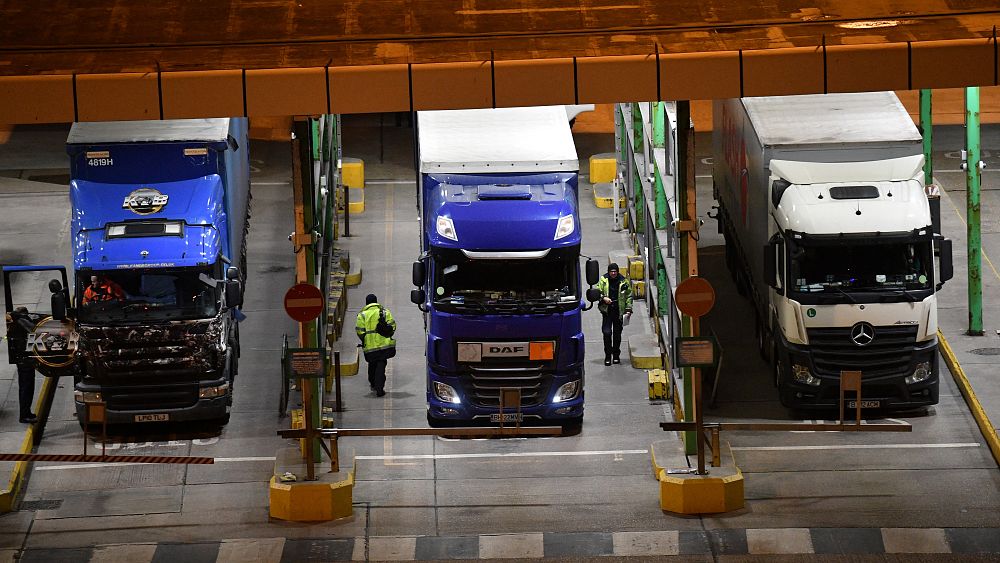
The UK announced on Tuesday it will again delay border checks on goods coming from the EU until next year, citing supply chain issues.
Britain’s Cabinet office said in a statement that the “revised timetable will give businesses more time to adjust to new processes”.
The government said that the pandemic has affected supply chains in the UK and across Europe and that its agri-food sector has been particularly hit.
However, government critics and some trade experts say Boris Johnson’s administration has been ill-prepared for new border changes that are the result of the hard Brexit negotiated with the EU.
Full customs declarations and controls will be introduced as planned on January 1, 2022. But under the new delay, paperwork and checks for EU farm products that were due to take effect from October won’t be introduced until next year — three months late.
Export health certificates also due to be required from October won’t be brought in for another nine months, until July 1, 2022. Safety and security declarations will also not be needed until next July — a six-month delay.
The government’s original plan was to introduce border checks on EU imports when the post-Brexit transition period expired at the end of 2020. In June that year it said these checks would be phased in, and then last March announced a further delay of several months.
The new, further delays were announced in a House of Commons written answer.
“We want businesses to focus on their recovery from the pandemic rather than have to deal with new requirements at the border, which is why we’ve set out a pragmatic new timetable for introducing full border controls,” Cabinet Office Minister Lord David Frost said.
“The government remains on track to deliver the new systems, infrastructure and resourcing required” to carry out the controls, he added.
The government cites the pandemic, but the UK’s post-Brexit departure from the EU’s Single Market and Customs Union, which was completed on January 1, has not been without its issues. The EU introduced the consequent new border rules immediately, impacting UK exports.
Although many businesses had anticipated friction, stocking up in advance, the new red tape and costs hit traders hard.
The problem was compounded during the pandemic — when global supply chains were disrupted by lockdowns — and by a shortage of workers in the UK, particularly lorry drivers, prompted by the departure of EU citizens and COVID-induced travel disruption.
The delays were particularly damaging for fresh produce and led to many supermarkets in the UK sporting empty shelves.
The Bank of England reported earlier this month that the employers’ pool of candidates was dropping at “record pace” with many struggling to fill empty positions.
The latest delays follow the British government’s suspension of checks on food products sent from Britain to Northern Ireland, under the Brexit divorce treaty. Its impact has brought disruption and renewed tensions between London and Brussels. The EU has however put legal action against the UK on pause.
The British Chambers of Commerce called the latest delay to border checks “sensible”. But the UK’s Food and Drink Federation accused the government of blindsiding businesses that had prepared for checks.
“This move penalises those who followed government advice and rewards those who ignored it,” chief executive Ian Wright said.
He added that “the asymmetric nature of border controls facing exports and imports distorts the market and places many UK producers at a competitive disadvantage with EU producers”.
The employers’ organisation the CBI said the delay should ease pressure on supply chains in the run-up to Christmas, while warning that underlying difficulties for businesses needed resolving.
It called for a bespoke UK-EU veterinary agreement which would reduce most border controls, and for an easing of post-Brexit immigration rules to address the chronic labour shortage.
David Henig, director of the trade think-tank ECIPE, recalled that it was the UK’s choice not to extend the Brexit transition period, which would have delayed all new border checks.
“The Government choice not to extend merely meant checks on UK exports and greater staff shortages,” he tweeted.